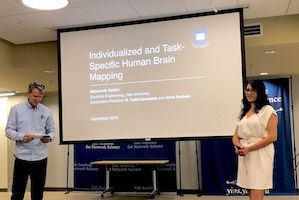Mehraveh Salehi Graduated




Mehraveh Salehi Graduated with her PhD thesis entitled “Individualized and Task-Specific Human Brain Mapping”.
The final doctoral examination for Mehraveh Salehi took place on Tuesday, September 3rd, at 11:00am at YINS, 17 Hillhouse, 3rd floor.
The title of the thesis is: Individualized and Task-Specific Functional Brain Mapping
Adviserr:
- Amin Karbasi
- Todd Constable
Members of the Committee are:
- Professor Papademetris
- Professor Tassiulas
- Professor Jeff Bilmes
Abstract: Understanding the human brain, with its remarkable ability to control higher thought, behavior, and memory, remains one of the greatest intellectual challenges in all of science. Recent advances in neuroimaging techniques, such as fMRI, have made it possible to measure neural activity in the human brain. However, fMRI data are not only massive in size but also spatially and temporally complex. In my thesis, I develop advanced data summarization techniques to study brain function and its link to behavior. While traditional fMRI studies have typically collapsed data across individuals and cognitive states, here, I develop personalized algorithms that can preserve individual and state differences. I establish that individual and state differences in brain maps (also known as parcellations) are reliable and functionally relevant, such that features extracted from these parcellations can successfully predict behavioral phenotypes of individuals as well as their brains’ cognitive states. In the first empirical chapter (chapter 2), I propose a network-based predictive model which successfully predicts attentional abilities for novel individuals and generalizes across attention tasks and behavioral measures. In chapter 3, I develop a submodular-based algorithm for individualized network-level brain parcellation and demonstrate that the brain networks are different across individuals, and show reliable sex-specific patterns which can be utilized to predict individual sex. In chapter 4, I demonstrate that the functional networks are not only different across individuals, but also reliably vary across cognitive states, such that they form a predictive signature of the underlying cognitive state. In chapter 5, I propose a new submodular-based algorithm for individualized node-level brain parcellation and show that compared to the group-level parcellation, the proposed individualized parcellations exhibit a stronger predictive power in predicting IQ, highlighting its ability in preserving behaviorally relevant information. In chapter 6, I demonstrate that the individual brain parcellations are unique and reliable, such that they can act as an identifying ‘fingerprint’. In the final empirical chapter (chapter 7), I challenge one of the longstanding assumptions in the field by demonstrating that the individualized node-level brain parcellation are not fixed, but they reliably reconfigure with brain’s cognitive state. I demonstrate that a measure of node configuration as coarse as node size can significantly predict the task condition under which the data were acquired, as well as the within-condition task performance. The work presented here provides a theoretical and empirical foundation for future research seeking data-driven approaches to understanding brain function, and its relationship to behavior.